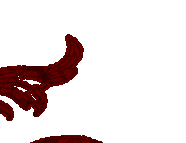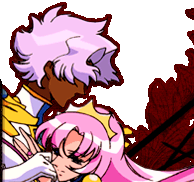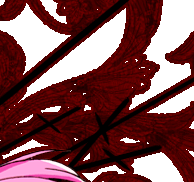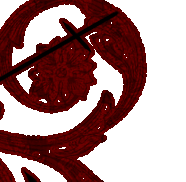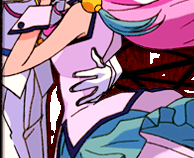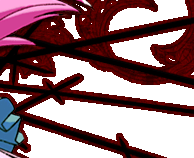
This analysis
was donated by Maarika. 
Sartre's slogan “existence precedes essence” means that every individual is able to shape their own identity through existence (Crowell 2004: para. 1). Nothing is predetermined and every choice is made by everyone on their own. Because there is the freedom of choice, it is everyone's own responsibility to actively make a choice for themselves. Making a commitment means to be living in a certain consciously chosen way through which the essence is created; while living as if having no freedom of choice is considered “bad faith” in existentialism. (Banach 2006) These existential themes are reflected in the Japanese animation series Shoujo Kakumei Utena (1997) through symbolism and metaphors. The series's titular character Utena – a girl aspiring to become a prince – gets involved in duels where Anthy, the Rose Bride, is passed around as a trophy. The existentialistic idea of existence preceding essence is portrayed in several visual motifs, such as the duelling and coffins, through which the characters' ideals, self-images and the substantial differences in constructing their identities become apparent.
The duels are one of the most important plot devices in Shoujo Kakumei Utena and they reveal a great deal about who the characters really are. Of all the duels Utena fights, there is only one she loses. Not only that, but in almost all the cases her opponents are more skilled and experienced than her (there is Saionji the kendo club president and Juri the fencing team captain), so there must definitely be something that helps Utena to win. The princely ideal that Utena tries to live by is what sets her apart from the rest of the duellists. She never (with an exception of one duel) duels anyone to gain something from it for herself. The proof to that is Dios, her prince, who descends from the illusionary castle above the duelling area to help Utena win. Dios represents the highest princely ideals, he is the manifestation of nobility. Because Utena fights for the sake of someone else (Anthy usually), Dios supports her selfless cause. It should be noted that not once does Dios support another duellist but Utena because all the other duellists have some personal or selfish reasons for fighting. Existentially, it is courage (another princely trait) that lies behind Utena's victories. Even when she has to fight with someone who is clearly on a higher skill level or when she simply does not stand much chance, she still never gives in or flees. Making a commitment means to be consciously living one's life in a particularly chosen way (Crowell 2004: para. 14). Utena has chosen a way to live by following the princely ideals (by being noble) and she continuously makes a commitment to it (doing her best not to lose her strength and nobility).
Utena has found a way to live by trying to become a prince – this is her existentialistic commitment and through this she is creating her self-identity. There is only one duel that Utena loses in the entire series. In episode 11 (Graceful and Ruthless; The One Who Picks the Flower 1997), the student council president Touga challenges Utena to a duel. What is noteworthy in this case is that the circumstances which Utena finds herself in are a bit different than with her previous opponents. Touga has been trying to win Utena's favour right from the beginning and by episode 11, he has made Utena believe that he might be the prince Utena has been looking for. Utena, in her naïvete, is not able to tell Touga's true intentions apart and she does not realise she is being manipulated. The duel itself offers Utena every chance to win: Dios descends from the castle to support her and Touga gives her an opportunity to a clear hit by stopping fighting in the middle of the duel. This proves to be a clever move on Touga's part because Utena hesitates to strike the finishing blow. It is this moment of self-doubt that leads her to losing the duel. Even though she stopped making a commitment to her ideals for only a moment, it was enough for Touga to use the opportunity and make a move to win the duel.
Utena's self-identity is closely connected to the commitment she makes; thus when she starts doubting herself she loses sight of her ideals and values. Touga probably knows he would not have stood a chance in his duel if he did not try to manipulate Utena somehow. After losing the duel, Utena tries to find a new way of life instead of becoming a prince. In episode 12 (Perhaps for Friendship's Sake 1997), she stops wearing the boys' uniform which was part of her princely self-image; instead, she begins to wear the girls' uniform like all the other 'normal' girls around her. Utena looks rather miserable during most of this episode because apparently being a 'normal' girl does not make her happy. This lasts until her best friend Wakaba, who was upset about seeing her friend so sad, tells her that Utena should reclaim whatever it was she lost. Utena realises through this that the girls' uniform does not really suit her and she challenges Touga to a rematch. Of course, the main reason why she decided to duel again was because she wanted to regain her lost self-identity.
Utena defines herself through the princely ideals (and also through Anthy who plays the role of a princess) and she knows that the only way to take that commitment up again is by winning the duel. If there is one time Utena fights selfishly then it is her second duel with Touga. “Self” – the title of the duel, revealed in the following episode (Plotting a Locus 1997), – reflects this as well. The duel in episode 12 (Perhaps for Friendship's Sake 1997) is the only duel in the series where Dios does not descend from the castle to support Utena because she is fighting for her own sake. Touga demonstrates how the Sword of Dios can become, with the help of the Rose Bride, even more powerful – this is yet another disadvantage for Utena. In fact, it can be said that this is a duel Utena is not supposed to win. The outcomes of the duels depend on the ideals and values the duellists hold but also to some extent on the Rose Bride who is not a mere bystander in these affairs (as can also be seen in episode 25, Our Eternal Apocalypse) although it might seem otherwise. In this duel, Utena gives her all to fight Touga despite the odds against her – she is completely relying on what she values in herself. While the only quality missing is the nobility (proved by the absence of Dios) in this case, her strength and courage are what ultimately lead her to victory. In fact, it becomes clear that Utena's skills are no match to Touga but her unwavering spirit to follow her ideals is what distracts the Rose Bride and the spell on the sword is broken. This is a moment of reminiscence for Anthy who sees her own prince in the self-sacrificing manner in which Utena fights. Even without Dios, Utena still wins because she is able to come close to being what she values in her own prince – as if, in a way, truly becoming that prince for a moment.
While the duels demonstrate the ways how the duellists live their lives, there are also instances where the characters have not even made a commitment for living. The coffins are symbols of non-existence in Shoujo Kakumei Utena. They first appear in episode 9 (The Castle Said to Hold Eternity 1997) in a flashback about Utena's past. When Utena was little her parents died and Utena hid herself in a coffin because she did not want to live any more. Utena did not understand why people went on living if they would die anyway; she said she did not want to live because nothing was eternal. In this case, coffin is not as much of a symbol of death as it is a symbol of non-existence. Utena eventually leaves the coffin because she is shown “something eternal” (The Castle Said to Hold Eternity 1997) thanks to which she makes a commitment to live. The whole instance of leaving the coffin behind equals to finding a meaning in life and/or making some sort of commitment.
Utena's reason, that “eternal” thing, for making such a commitment was Anthy's suffering. In the flashback of episode 34 (Seal of the Rose 1997) it is revealed that Anthy was doomed to be the Rose Bride for all eternity as a punishment for taking away the prince from the world. When little Utena learns about Anthy's terrible fate, she promises to become her prince to free her from her eternal suffering. It is left rather unclear whether Utena ever remembers all the details of this event (for example, making a promise to Anthy) but what matters is that Utena's commitment to become a prince defines her existentialistic struggle throughout the series. Utena knows that nothing is eternal, so Anthy's suffering might have seemed absurd to her which is the reason why she felt compelled to do something about it. Utena finds a meaning for her existence in the fact that life is not eternal. It is given that no one lives forever but if and how people use the time in between is entirely up to them.
There is another aspect to the coffins; namely, by being in a coffin, the person is completely cut off from life and all the good and bad things that are associated with it. In other words, it is a state that prevents the person from actively creating themselves and their true self is pure and blank. The reason why Anthy has locked her true self in a coffin is because she lacked the qualities to face life and all its downsides. Yet, by doing this, Anthy has chosen not to exist and not to make any active commitment. From an existentialist point of view, Anthy is living in a “bad faith” (Banach 2006) because she does not realise that she has the power to change her own life. In contrast to Anthy, Utena is able to carry on living her life in a specific way because she is courageous. While it takes little effort to be shut off from everything, it takes strength and courage to face everything life has to offer.
“Existence precedes essence” is best seen in the final duel of the last two episodes (The Ends of the World and Someday, Shine with Me 1997) where Anthy appears in a coffin from where Utena tries to save her. The final duel (fittingly called “Revolution”) is exceptional in many ways. First and foremost, this is the duel that Utena fights against her own prince. At the same time, Anthy is about to resign to her fate and continue her never-ending suffering. When Utena realises that her prince is not going to do anything to save Anthy, Utena gives up on her fairy tale ideals (that is, relying on a prince to save someone) and decides to save Anthy herself. There is a scene where Utena reaches the coffin where Anthy has locked her true self in. Utena is able to open the coffin but not enough to reach in and save Anthy. Anthy, being naked (this represents the purity and birth of a person, for she has not created her self-identity yet), wakes in the coffin and realises what Utena is doing. Utena's wish to save Anthy is selfless, noble and self-sacrificing just like her prince was (whom she no longer needs) but even this is not enough to save another person. Anthy, however, is deeply moved by Utena's persistent effort and she chooses to reach out to Utena.
Ultimately, it necessary to make a conscious effort in choosing a course of action to live one's life by and no one can forcibly create others' essence (this is why Utena failed to save Anthy). The moment that Anthy sees Utena's desperate attempt to save her sets in motion Anthy to start realising her own self-worth and the freedom of choice she possesses. Some time after the duel, Anthy, who has been completely passive during most of the series, leaves Ohtori Academy behind. In order to do this, Anthy had to leave her coffin and adopt a new way of life. This is also reflected in her new appearance: Anthy stops wearing glasses and lets her hair loose (bound hair and glasses were both symbolic to the Rose Bride). Despite not being able to save her, what Utena managed to do was to show Anthy that she possesses a free will and a freedom of choice just like everyone else (that she is not merely the Rose Bride). The bells tolling at the end of episode 39 (Someday, Shine with Me 1997) mark the end of the duel called “Revolution” – this is the moment when Anthy steps out of the campus grounds to start a new life and create her true essence.
In the end, the duels were a process of self-creation through which the participants were able to realize their ideals and act according to the values they possessed. At the same time, the coffins served as a means to live in “bad faith” from where it was possible to break free by adopting a commitment. Through (re)discovering her self-worth and freedom, Anthy found a reason to create her own self-identity – that was the revolution Utena had triggered. Even though this revolution seemed not to have been a big deal on the surface, it deeply moved Anthy and changed her life.
 Bibliography Banach, David. 2006. The Ethics of Absolute Freedom.
Available at
http://www.anselm.edu/homepage/dbanach/sartrelecture.htm, accessed 12 June 2008.
Crowell, Steven. 2004. Existentialism.
Available at
http://plato.stanford.edu/entries/existentialism/#2, accessed 12 June 2008.
Ikuhara, Kunihiko (Director). 1997. Shoujo Kakumei Utena [Revolutionary Girl Utena]. Japan: J.C.Staff.
 |


